Analysis: What farmers need to know about bluetongue
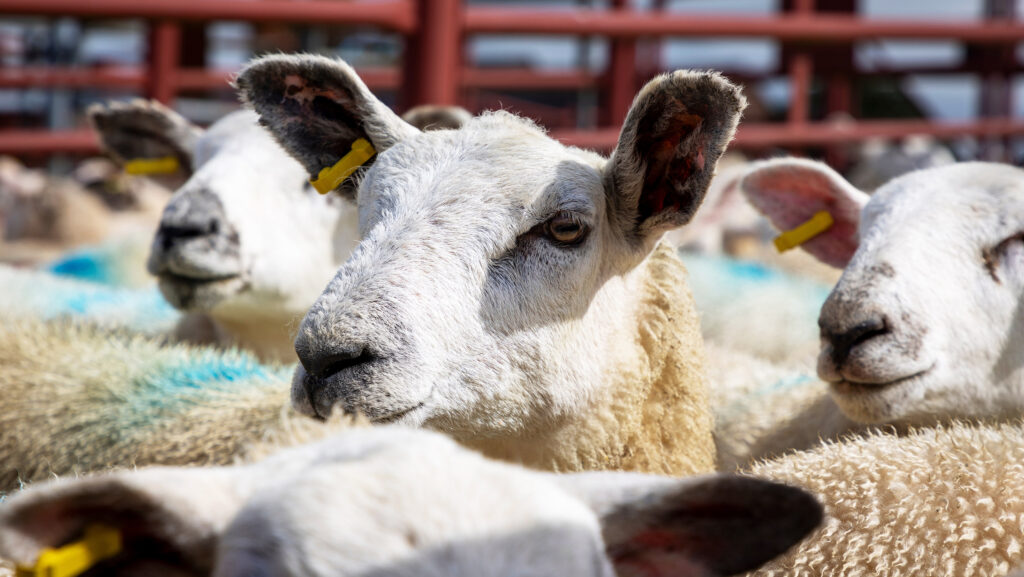 © Gary Naylor Photography
© Gary Naylor Photography The current outbreak of bluetongue virus serotype 3 (BTV-3) is likely to get worse in the coming weeks before it improves, warn industry leaders.
Since the first case in this current outbreak on 26 August, bluetongue virus BTV-3 has been confirmed on 34 farms in England with well in excess of 100 animals diagnosed with the disease, says the Animal and Plant Health Agency (Apha).
Industry leaders are nervous that if more cases emerge outside the restricted zone (RZ) in eastern England, the impact on trade and animal movements will get much worse.
See also: Q&A: All you need to know about bluetongue disease
At this time of the year, the sheep industry is dependent on a high number of movements for store lambs and breeding stock.
The beginning of September is a period when the movements of sheep peak due to farmers selling their breeding stock and others replacing their sheep in the lowlands, explains Phil Stocker, chief executive of the National Sheep Association (NSA).
“Both breeding stock and store lamb movements are traditionally high over these autumn months,” he says.
This aspect of trade is crucial for many upland farmers as much of their work over the year is related through selling breeding and store animals, which forms a large part of their income.
“If this [BTV-3] goes the way it might, then many upland sheep producers will find it has a serious impact on the economic viability of their businesses,” cautions Mr Stocker.
Movement restrictions
The Defra-established RZ covers Essex, Suffolk and Norfolk, while an additional temporary control zone (TCZ) around the East Riding area of Yorkshire has been set up.
Cattle and sheep can move from the RZ to slaughter anywhere in Great Britain as long as the abattoir is designated as able to accept animals from a bluetongue zone.
Any abattoirs within the RZ can take animals for slaughter from within or outside the RZ.
Sales of finished stock through livestock markets within the RZ can continue to be part of this critical supply chain.
For movements to live, animals can move freely within the RZ, whether to be sold there, or to linked business premises within the zone.
But they cannot move outside of the RZ without a specific licence that needs advanced approval from Apha.
This will include both pre- and post-movement blood testing to ensure an absence of infectivity.
Defra has agreed to absorb the laboratory costs of blood testing, but in cases where private vets are taking samples, these costs will need to be borne by the farmer.
Animals can freely come into the RZ from outside the area to live, which allows farmers to replenish their cattle herds or breeding flocks.
However, some farmers will be thinking hard about bringing breeding stock into a relatively high disease risk area, with no prospects of any compensation for mortalities.
Farmers need to be extremely vigilant by making their own visual checks of individual animals and of any animals they move off their premises – irrespective of where they are going.
Checking the general licence for further conditions on movement is essential.
In addition, Defra says farmers should move animals only where it is necessary. The future control of this virus will be – in part – down to farmers acting responsibly.
Gareth Hateley, a board member at the British Cattle Veterinary Association (BCVA) and a member of the Defra core group on exotic diseases, says some cattle are displaying significant clinical signs of BTV-3.
Symptoms
Typical symptoms include fever, skin lesions, such as crusting and erosion on the nose, teats and around the eyes, and reluctance to move.
A drop in milk yield or abortion in cows are also being observed.
“BTV-3 virus cannot be transmitted from cow to cow. However, because midges tend to bite cows because of their large size, they are significant in the spread of the disease,” says Mr Hateley.
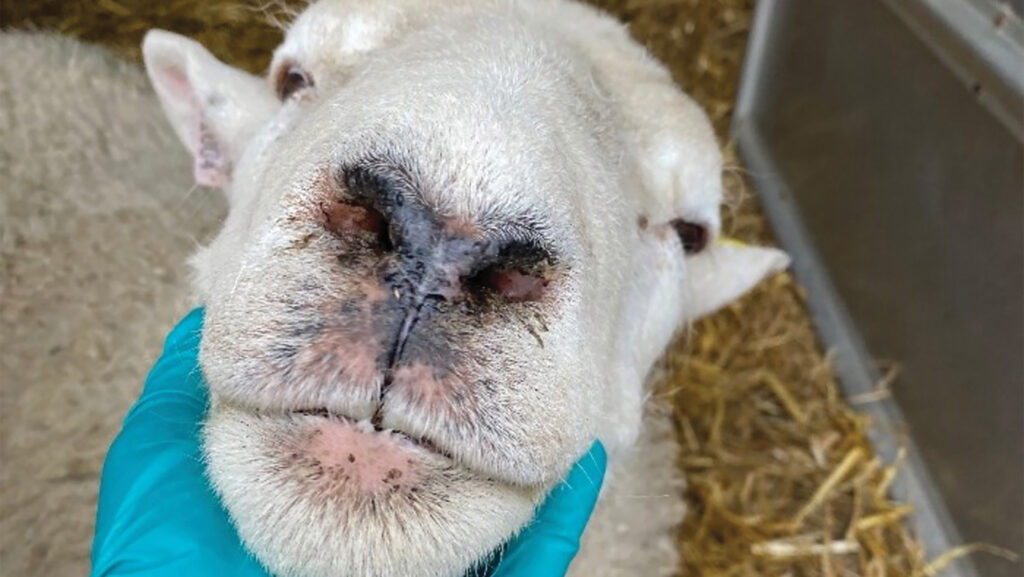
© Animal Plant Health Agency
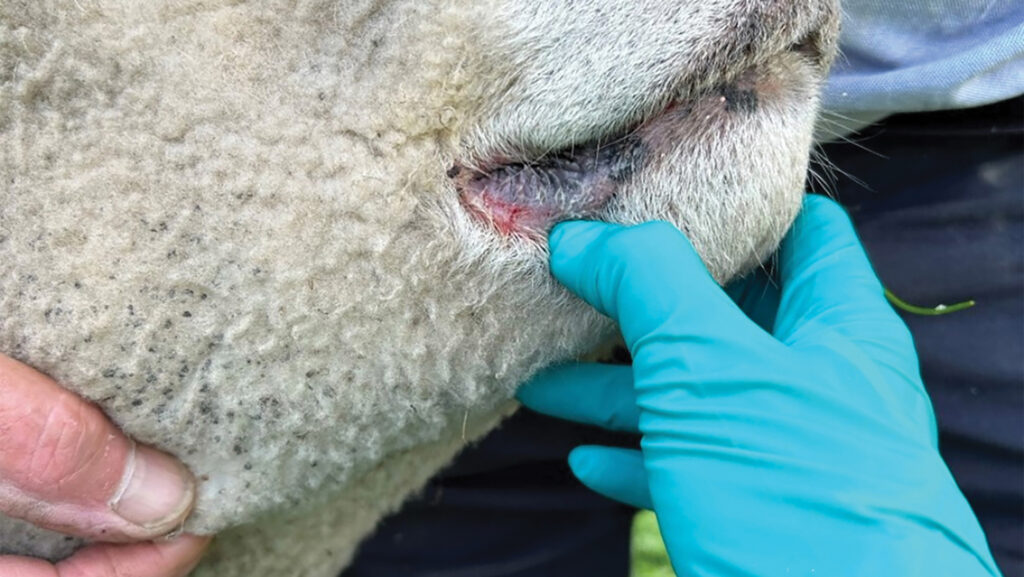
© Animal Plant Health Agency
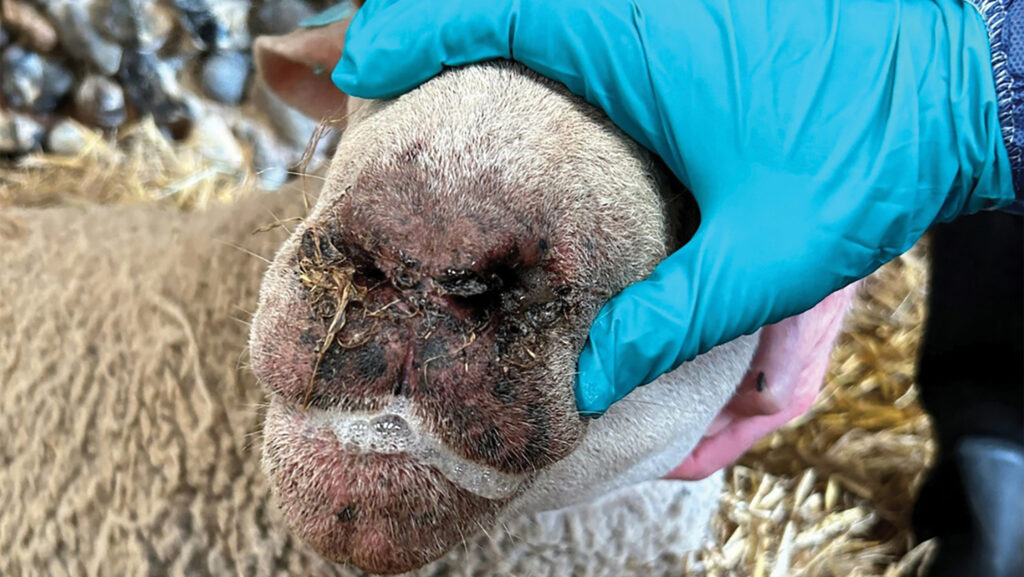
Bluetongue symptoms include blisters or lesions, which may be quite subtle © Animal Plant Health Agency
Where to report suspected cases of bluetongue
Farmers should report all suspected cases of bluetongue to:
- England: Apha on 03000 200 301
- Wales: Apha on 03003 038 268
- Scotland: Your local field services office
Further detailed information on BTV-3 is available on the Ruminant Health & Welfare website.
Vaccination
Defra secretary Steve Reed has given approval for the emergency use of three BTV-3 vaccines.
A general licence exists for vaccine use in high-risk counties of Suffolk, Norfolk, Essex, West Sussex and Kent.
Defra is also expected to offer licences for vaccine use outside of these counties, but a specific licence for use needs to be obtained from Apha.
Many farmers will be thinking about how they can protect their stock and weighing up the cost of vaccination against the financial risk to their businesses – and whether this is a wise investment.
“If high losses or production performance in unvaccinated animals are seen, then that investment will have clearly been worthwhile,” says Mr Stocker.
Keepers also need to be aware that these vaccines are suppressive in nature, rather than fully preventing the disease.
They are known to suppress symptoms, aid animal welfare, and reduce mortality, but will not prevent onward transmissions or infectivity.
Vaccine costs in the Netherlands and Germany have been equivalent to £8-£10 per animal.
Both these countries require veterinary administration, whereas the licensing in England will allow farmers to do the actual vaccination, which will significantly reduce the cost.
The vaccines can only be obtained through a veterinary prescription and there is a requirement for ensuring vaccination is done properly, with full traceability relating to the animals that have received the vaccine.
However, BTV-3 vaccination is currently not permitted in Scotland or Wales.
The manufacturers of the three authorised vaccines are reporting that vaccine will be available within two to three weeks by the time packaging, labelling and supply chains have been established.
The vaccines include warnings on the impact of their use in breeding males – of sheep and cattle – due to a potential temperature rise in vaccinated animals.
The other BTV strain vaccines are fully approved for use in pregnant animals and there is no reason BTV-3 should be different, says Mr Stocker.
Mr Hateley says “gaps” in the vaccine data will reduce as the manufacturers provide more details in the future.
“The decision whether or not to vaccinate cattle should be taken following a discussion between the farmer and the vet, taking into account risk factors, including where the farm is located, the business type and whether there are lots of animal movements in that business,” he suggests.
Midge activity
Weather conditions will also be a factor in how this virus behaves and spreads.
If the weather turns colder in October, it could prompt a reduction in midge activity with some farmers looking to delay vaccination until temperatures rise next spring when the use of the vaccine in breeding males and pregnant females is less of an issue.
By then, a clearer picture will have emerged around the effectiveness of these vaccines and the behaviour of the virus.
Defra has given as clear an assurance as possible that vaccine use will not affect export trade in meat and there is no reason why it should affect any domestic supply chains.
At the moment, exports of live sheep and cattle from Great Britain are prohibited due to the country’s bluetongue status. In addition, vaccine use under emergency authorisation will not overcome this hurdle.
Germinal products
Restrictions are in place on the collection of germinal products (semen, ova, and embryos) and farmers should seek advice from their local animal health office.
For domestic use, no germinal products can be taken or moved outside of the RZ. But there are no restrictions on stored embryos or semen coming back into the RZ and being used.
Case study: Suffolk sheep farmer fears further bluetongue cases
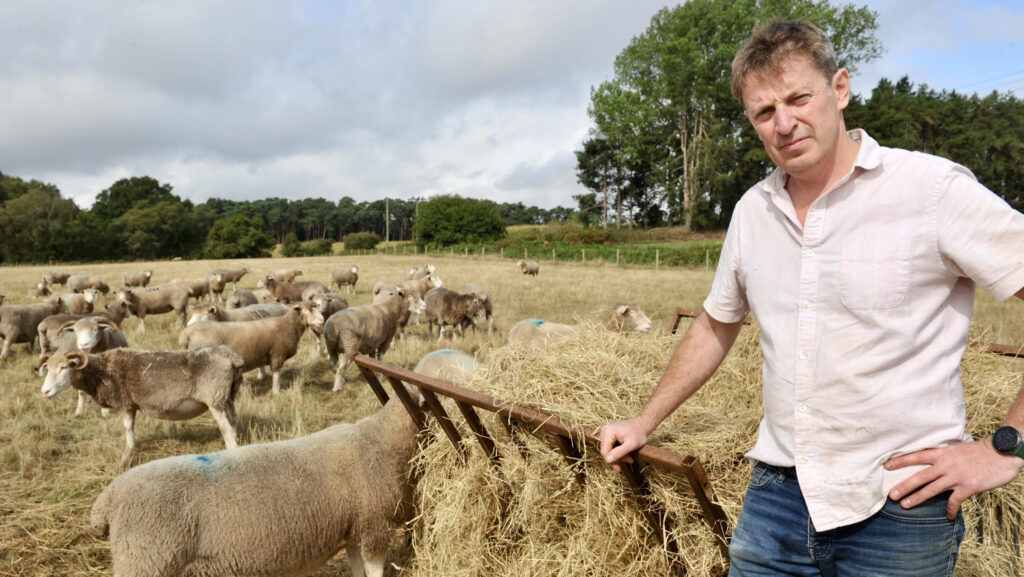
Tim Pratt © Lucy Taylor/SWNS
Suffolk sheep farmer Tim Pratt has lost six pedigree Poll Dorsets to bluetongue after a number of ewes were showing signs of the virus, which were later confirmed as positive cases.
Symptoms
“The most obvious symptoms were hypersalivation and a swollen nose (muzzle),” said Mr Pratt.
“There were no clear signs of foot-rot, but I also noticed that the sheep’s feet were sore, especially around the coronary band area where the hoof meets the leg.”
Blisters in the mouth are also a tell-tale sign of BTV-3 virus, Mr Pratt adds. “As the disease progresses, the blisters and hypersalivation get worse.
“Because of that, the sheep don’t eat or drink and just sit down and lose body condition.”
A further six sheep which are showing symptoms of bluetongue are being kept in isolation and are being treated with pain relief in the hope they can make a full recovery.
Movement restrictions
Following the outbreak at Wantisdon Hall Farms, Woodbridge, on 31 August, movement restrictions have been put in place by Defra.
This means no animals are allowed to be removed from the farm.
A special licence must also be obtained to move any animals for killing at a designated abattoir.
Mr Pratt is concerned there will be further confirmed cases in his flock.
He is also seeking more information about the vaccines and whether they can be used in pregnant animals and young lambs.
